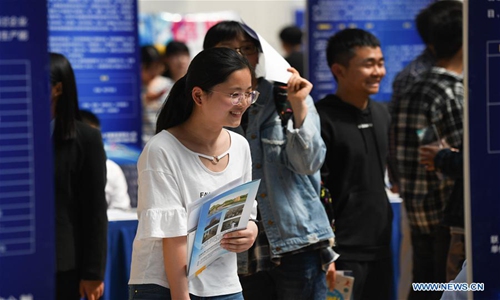Chinese cities loosen household registration requirements to lure talent, investors
Source:Global Times Published: 2020/5/9 17:42:35

A job seeker attends a job fair at Anhui Jianzhu University in Hefei, East China's Anhui Province, April 19, 2019. More than 4,200 job vacancies were offered by 126 employers at the job fair. (Xinhua/Zhang Duan)
More Chinese cities are loosening their urban household registration system to lure talented people and investors to dwell in their cities, as a part of the local governments' efforts to "accelerate urbanization" and speed up economic growth after the coronavirus is brought under control.
South China's Guangdong Province released detailed guidelines on Friday to accelerate the pace of urbanization. One of the policy amendments includes cities in the province with less than 3 million residents will be allowed to remove their previous barriers for rural residents to apply for urban household registration.
Besides Guangdong, some other cities, including Chongqing, Qingdao, Hangzhou, Suzhou, and Nanchang, all released new policies to ease the restrictions on household registration or hukou system. Most of these new regulations are primarily aimed at attracting talented people.
For instance, 16 cities in East China's Shandong Province eliminated all the barriers for college students and graduates by allowing them to apply for household registration. The province also encourages city governments to launch measures to lower living costs for college graduates.
Observers said that by loosening policies, the local governments have followed the guidelines of the National Development and Reform Commission issued on April 9 that calls for easing restrictions for rural residents who are applying for urban household registration status.
Speaking to the Global Times, Chen Shida, a senior researcher from the Zhejiang Institution of Talent Development, said city governments want to attract talented people as well as private investors to come to their cities, and help boost local economies.
How to ease the employment pressure and to make sure migrant workers can find jobs after urbanization are key issues currently gripping the local governments, Chen noted. This year, about 874 million college students in China are looking for employment, an increase of 400,000 from the previous year.
It's a good sign that some cities are setting examples to realize mutual recognition of the household registration in urban areas like the Yangtze River Delta and the Pearl River Delta, added Chen.
Shaoxing, a city in East China's Zhejiang Province, has taken the lead in the province to ease its household registration to attract talents since 2018.
The open household registration policy provides a solid ground for the city to attract more talented people, Luo Jihong, vice director of Bureau of Shaoxing Human Resources and Social Security, told the Global Times on Saturday.
Posted in: SOCIETY,CHINA FOCUS